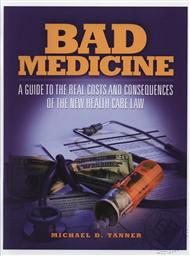Bad Medicine: A Guide to the Real Costs and Consequences of The New Health Care Law (Book/ Paperback)
by Micahel D. TannerProduct Overview
This incisive report provides an authoritative and revealing explanation of the new health care law’s provisions. Its diagnosis is that the law is bad medicine. It is likely to make Americans less healthy, less able to direct their own health care decisions, and places huge burdens on our economy and national debt.
This updated print edition was revised in February 2011. The revised report reflects more recent and accurate cost calculations and updates to related legal cases.
For better or worse, President Obama's health care reform bill is now law. The Patient Protection and Affordable Care Act represents the most significant transformation of the American health care system since Medicare and Medicaid. It will fundamentally change nearly every aspect of health care, from insurance to the final delivery of care.
The length and complexity of the legislation, combined with a debate that often generated more heat than light, has led to massive confusion about the law's likely impact. But, it is now possible to analyze what is and is not in it, what it likely will and will not do. In particular, we now know that:
* While the new law will increase the number of Americans with insurance coverage, it falls significantly short of universal coverage. By 2019, roughly 21 million Americans will still be uninsured.
* The legislation will cost far more than advertised, more than $2.7 trillion over 10 years of full implementation, and will add $352 billion to the national debt over that period.
* Most American workers and businesses will see little or no change in their skyrocketing insurance costs, while millions of others, including younger and healthier workers and those who buy insurance on their own through the non-group market will actually see their premiums go up faster as a result of this legislation.
* The new law will increase taxes by more than $669 billion between now and 2019, and the burdens it places on business will significantly reduce economic growth and employment.
* While the law contains few direct provisions for rationing care, it nonetheless sets the stage for government rationing and interference with how doctors practice medicine.
* Millions of Americans who are happy with their current health insurance will not be able to keep it.
In short, the more we learn about what is in this new law, the more it looks like bad news for American taxpayers, businesses, health-care providers, and patients.
About the Author(s)
Micahel D. Tanner
A Cato Institute senior fellow, Michael Tanner heads research into a variety of domestic policies with a particular emphasis on health care reform, social welfare policy, and Social Security. His most recent white paper, "Bad Medicine: A Guide to the Real Costs and Consequences of the New Health Care Law," provides a detailed examination of the Patient Protection and Affordable Care Act (Obamacare) and what it means to taxpayers, workers, physicians, and patients. He is also the author of, Leviathan on the Right: How Big-Government Conservatism Brought Down the Republican Revolution (2007), which chronicles the demise of the Republican party as it has shifted away from its limited government roots and warns that reform is necessary to avoid continual electoral defeat. His other books include, Healthy Competition: What's Holding Back Health Care and How to Free It (Second Edition, 2007), The Poverty of Welfare: Helping Others in Civil Society (2003), and A New Deal for Social Security (1998). Tanner's writings have appeared in nearly every major American newspaper, including the New York Times, Washington Post, Los Angeles Times, Wall Street Journal, and USA Today. A prolific writer and frequent guest lecturer, Tanner appears regularly on network and cable news programs. The New York Times refers to him as "a lucid writer and skilled polemicist." Under Tanner's direction, Cato launched the Project on Social Security Choice, which is widely considered the leading impetus for transforming the soon-to-be-bankrupt system into a private savings program. Time Magazine calls Tanner, "one of the architects of the private accounts movement," and Congressional Quarterly named him one of the nation's five most influential experts on Social Security. Before joining Cato in 1993, Tanner served as director of research of the Georgia Public Policy Foundation and as legislative director for the American Legislative Exchange Council.
List Price: $15.00
Our Price: $12.59
You Save:
$2.41(16%)
+ Free Shipping w/ $45 min. purchase
Category: Civics
Format: Book (Paperback) (52)
Publisher: Cato Institute
Date Published: Feb 01, 2011
Language: English
SKU: LT-2341
Dimensions: 8.50 x 11.00 x 0.25 (in)
Weight: 7.50 oz










